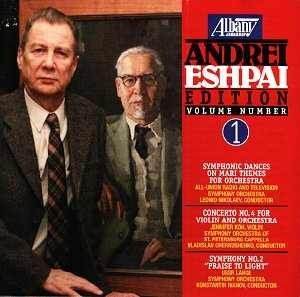I have known Eshpai’s attractive music ever since
hearing tapes of various Melodiya LPs back in the 1970s. His first
three symphonies are compellingly attractive works in a nationalistic
accessible style. He is the composer of seven symphonies and many
concertos. Even so he has not made the progress made by many of
his ‘compatriots’ including Terteryan, Silvestrov and Boiko.
His Mari Dances are very romantic.
They amount to a composite overture in sections. The first section
starts with one of those long uncomplicated melodies of the Russian
steppes characteristic of Rimsky in Antar. It rises in
splendid string carillon towards more complex tonalities. These
are never strained. In fact the music rather sounds as if John
Williams might have been listening to Eshpai. Towards the end
there is an atmospheric ‘whistling’ solo violin and then (6.28)
a buzz-saw wasp flight of a scherzo dashes in. The bounce and
élan reminds me of Khachaturyan but this impression soon
decays into the mood of the first section where the tune (implying
great lonely distances) is intoned by the cor anglais. The tune
is of some stature: robust and long-limbed, rising in passion
over barking brass.
The very recent Violin Concerto No. 4 is
spikily Bartókian; full of dark energy - tossing and turning.
Insect clouds alternate with flaming landslides of sound. Strenuous
fireworks, hoarse violin figures and a quietly threnodic contemplation
are all there. This is a pocket concerto like the Knipper and
Rakov concertos but it is a tougher nut to crack than either of
those pieces. The final section is jazzy and resembles, in spirit,
Bernstein’s Candide overture. This is a live performance
complete with applause and coughs - surprisingly few.
The Second Symphony at first comes over
as a concerto grosso complete with neo-classical ‘jerkiness’.
The sound world is not at all abstemious, adopting a Goossens-like
‘big band’ approach. There are dashes of Shostakovich-like gutsiness
in there. At 3.35 the tender middle section conjures visions of
emerald green and white-flecked depths. Hansonian brass writing
intermittently stalks the pages. The symphony is in two tracks.
The second track begins with the balalaika (oddly like The
Godfather theme): sentimental stuff. This is a clock-slowing
meditation rising at 4.20 and taking up the theme. Introspection
gives way to a pizzicato string episode (5:53) clearly inspired
by Britten’s Simple Symphony. At 8.08 the balalaika returns
but with the addition of the high harmonics of a solo violin (redolent
of Pettersson 7). The symphony ends with somehow completely congruous
Hispanic stateliness. We are told that the second symphony was
highly regarded by Kodaly.
The liner notes are principally by Victor Ledin.
Alla Bogdanova and Dmitri Ukhov also contribute. The notes (7pp)
are in English only.
No-one who loves the modern Russian romantics
will want to miss this disc. If you enjoy this then try the other
Eshpai symphonies when they come out from Albany. Also do try
to track down Rostislav Boiko’s symphony No. 2 and Valentin Silvestrov’s
Symphony No. 5.
Rob Barnett
